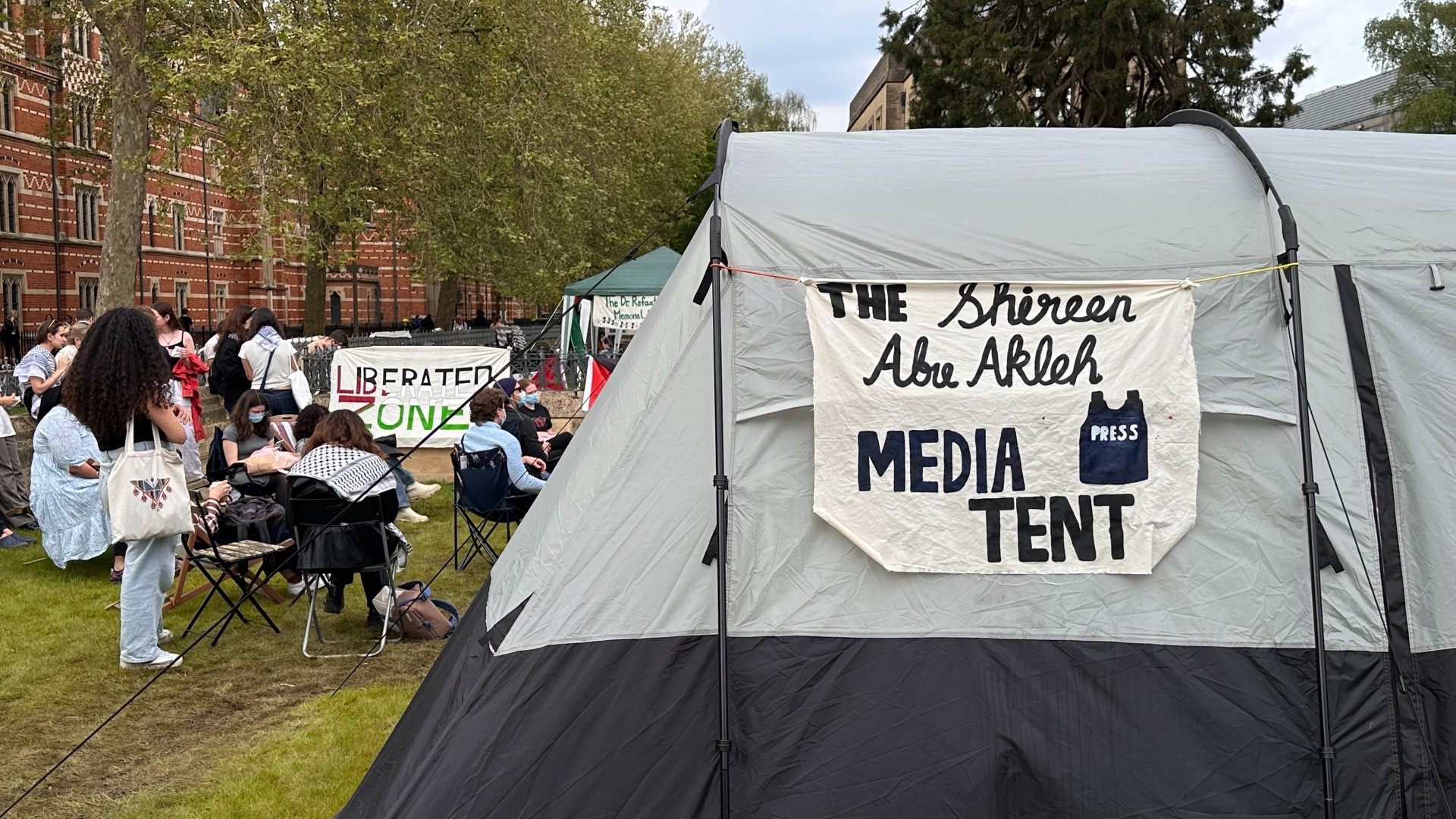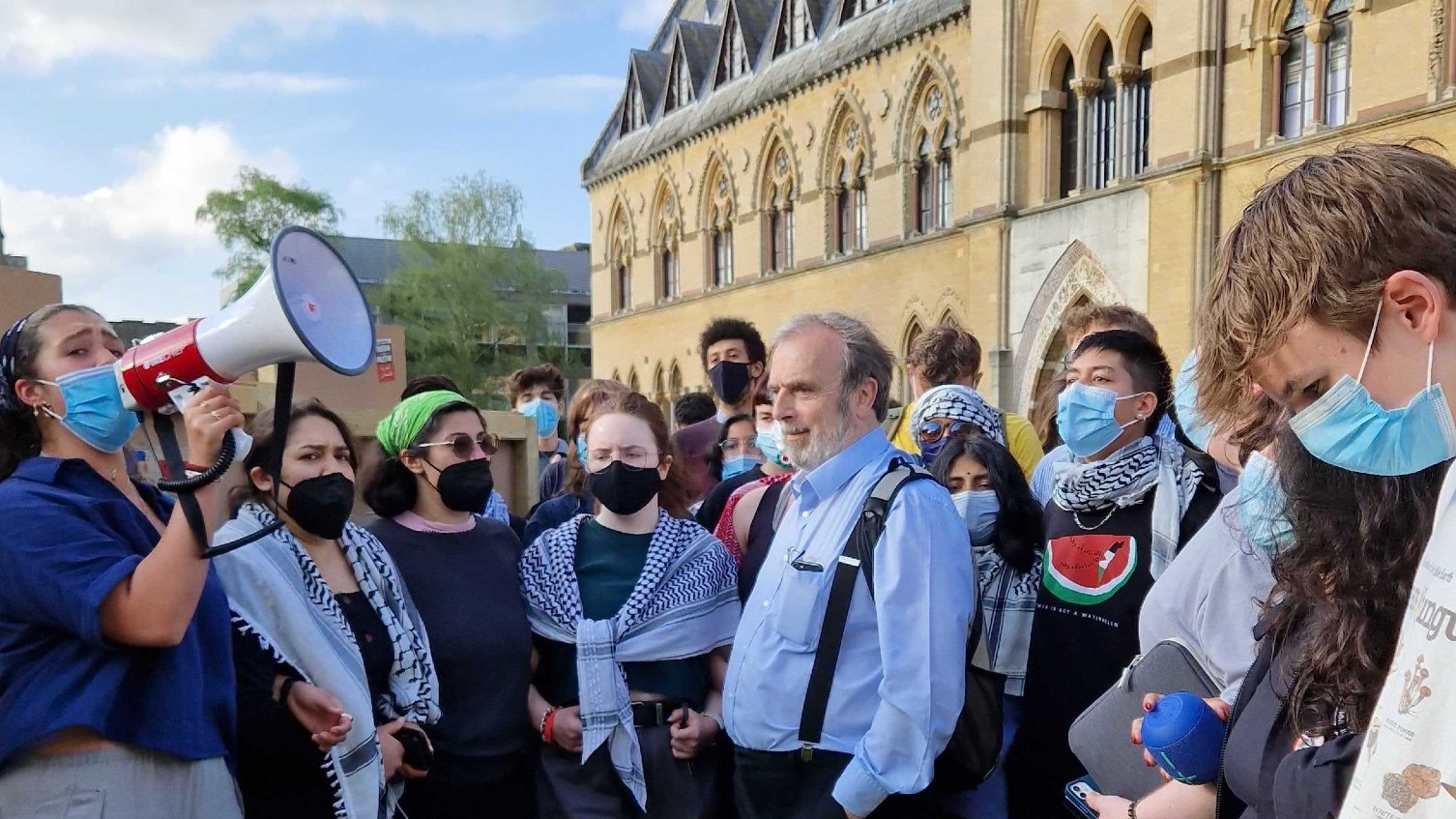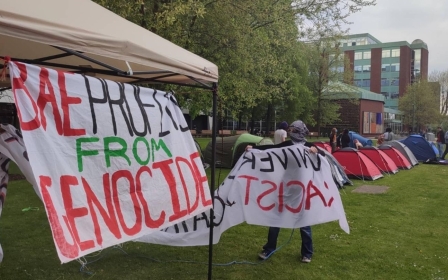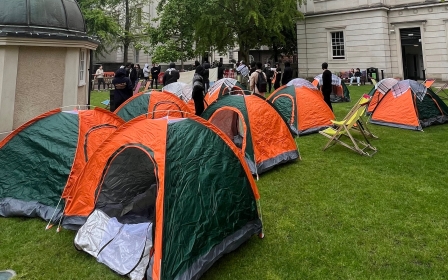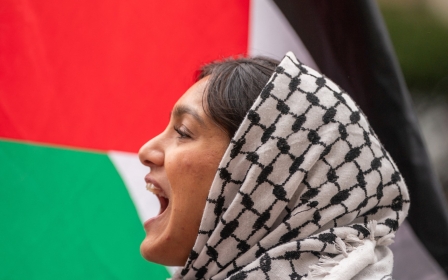With every university in Gaza destroyed, Oxford students say their protest is justified
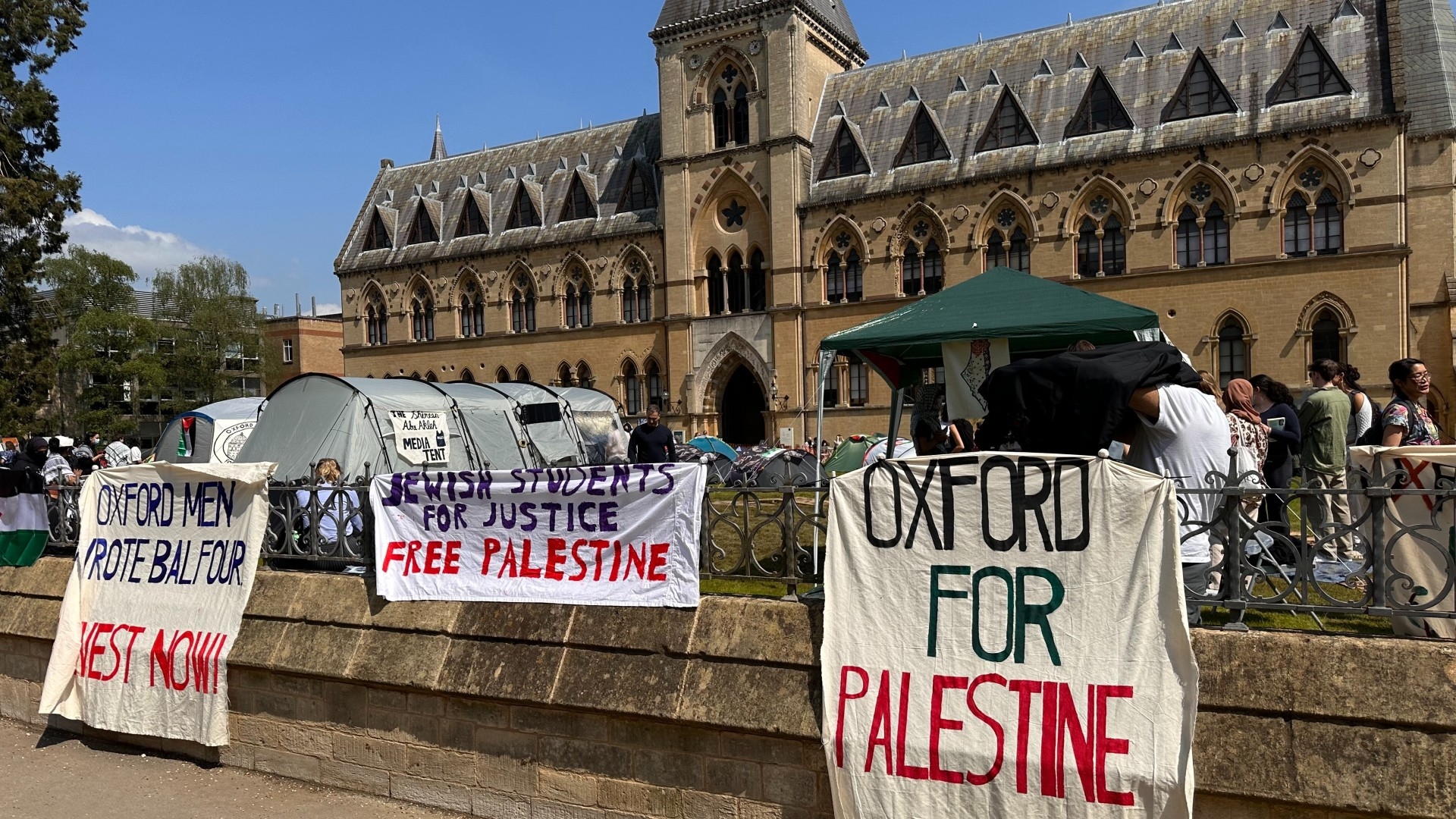
Dozens of brightly coloured tents adorned the lawns outside Oxford University's natural history museum early on Tuesday, as a chorus of pro-Palestine chants echoed around the historic 19th-century neo-Gothic building.
Adorned in keffiyehs and holding hand-painted banners emblazoned with messages of defiance, more than 100 protesters could be heard passionately lobbying the university to cut ties with arms manufacturers and companies linked to Israel, and back calls for a ceasefire as the war rages on in Gaza.
'I feel lucky I'm able to study. There are no universities left in Gaza'
- Anna, student
Most of the people who had gathered at the encampment were students, more of them postgraduates than undergrads, and a handful of academics could also be seen in attendence, rallying against the devastating war on Gaza which has claimed at least 34,700 Palestinian lives so far.
The scene was in stark contrast to the images from the US over the past week, where heavily armed riot police violently dispersed and arrested hundreds of peaceful protesters.
There was no visible police presence at the Oxford protest, and no attempts had been made either by the museum or university authorities to have the encampment shut down.
New MEE newsletter: Jerusalem Dispatch
Sign up to get the latest insights and analysis on Israel-Palestine, alongside Turkey Unpacked and other MEE newsletters
Students could be seen gathering on camping chairs for "teach-ins", and an academic from Oxford’s Department for Education could be heard delivering a talk.
"To me, as an academic at Oxford," she said, "it feels like this is the real university."
She read out a letter by 20 presidents at Palestinian universities addressed to students in Gaza solidarity encampments around the world: "Your protests give hope to humanity that justice is not an abstract process … Your solidarity stands as a beacon of hope," the letter read.
"We welcome you at our universities in a liberated Palestine."
Every few minutes, a passing car beeped their horn in support of the encampment. The protesters responded by cheering and applauding.
The protesters also erected a temporary wall on one side of the camp which urged people to write messages on it "if you want apartheid to fall".
Elsewhere, large tents could be seen named after prominent Palestinians killed by Israel in the last seven months of war.
The media tent was named after Shireen Abu-Akleh, a Al Jazeera journalist known across the Arabic-speaking world who was killed by Israeli soldiers in the occupied West Bank in May 2022. Close by stood the "Dr Refaat Al-Areer Memorial Library", named after the professor and poet who was killed by Israel in Gaza last December.
At the memorial library, students could be seen gathering to read, talk and design posters.
A medical tent was also erected and was named after Hammam Alloh, a Palestinian doctor and kidney specialist at Al-Shifa Hospital who was killed in November.
Six demands
At the heart of the encampment, one of the main protest groups, Oxford Action for Palestine, displayed a board that listed six of the demands they had.
The demands included that the university pledge to "boycott Israeli genocide, apartheid and occupation", to "disclose all finances", "stop banking with Barclays", help rebuild Gaza’s education system and "divest from Israeli genocide, apartheid and occupation".
'There is no university in the history of human civilisation that is more complicit in violence, dispossession, and the building of destructive colonial empires than... Oxford'
- Oxford Action for Palestine
"There is no university in the history of human civilisation that is more complicit in violence, dispossession, and the building of destructive colonial empires than the University of Oxford," they added in a statement.
One student, who requested to remain anonymous, told Middle East Eye that they feel uncomfortable with the large media presence at the university and that so much attention was being placed on students "who have an education and who have the privilege to be donating food and tents".
"We need to be keeping the focus on the people who are going through this and being targeted in Gaza," the student said, adding that for months Oxford had failed to listen to their concerns.
The student also rejected the common criticism that such encampments are divisive and antisemitic. "I’m Jewish, other people are Jewish here," the student said. "There are Palestinians here. There are Muslims here. There are Christians here, there are atheists here.
"We all are here because we know what’s going on [in Gaza]."
At about 6pm the atmosphere appeared to turn tense when prominent columnist Peter Hitchens, an Oxford resident, arrived and was told he couldn't enter the encampment because his newspaper, the Mail on Sunday, had been blacklisted.
Hitchens said that the protesters had no right to deny him entry and proceeded into the encampment anyway.
As he asked the protesters about their views no one answered. Within minutes around 50 people lined up against him and began chanting pro-Palestine slogans.
No threats were made against the journalist and he was asked whether he would like to leave. Hitchens replied that he was enjoying himself.
He walked around the encampment some more, followed by the students, and noted to MEE that "on the main issue of [Israel's bombing of] Gaza, I agree with them entirely. But they don't know that, because they won't speak to the Mail on Sunday." Shortly afterwards, he left.
Anna, a first-year medical student who is part of the organising team, told MEE that the encampment was still in its infancy but receiving generous support from the local community.
Such help, she said, would enable them to remain there for "some time".
Anna said she felt motivated to protest as a medical student after hearing about the devastation in Gaza: "I feel lucky I’m able to study. There are no universities left in Gaza."
More than 80 percent of Gaza's schools have been severely damaged or destroyed by Israeli air strikes and shelling, including every one of the strip's 12 universities.
At the camp, an international student studying law told MEE that he was partially protesting in a show of solidarity with his American peers.
"A lot of my friends in the US have been forming encampments. My home state Texas has seen incredible amounts of police repression and state repression, and I want to stand in solidarity with [the protesters] as well as the people in Gaza," the student said.
As dusk approached, the encampment appeared to mushroom in size. "We've had so many people that now want to join," Anna said, "that it’s hard to fit everyone on this patch of grass."
Middle East Eye delivers independent and unrivalled coverage and analysis of the Middle East, North Africa and beyond. To learn more about republishing this content and the associated fees, please fill out this form. More about MEE can be found here.


